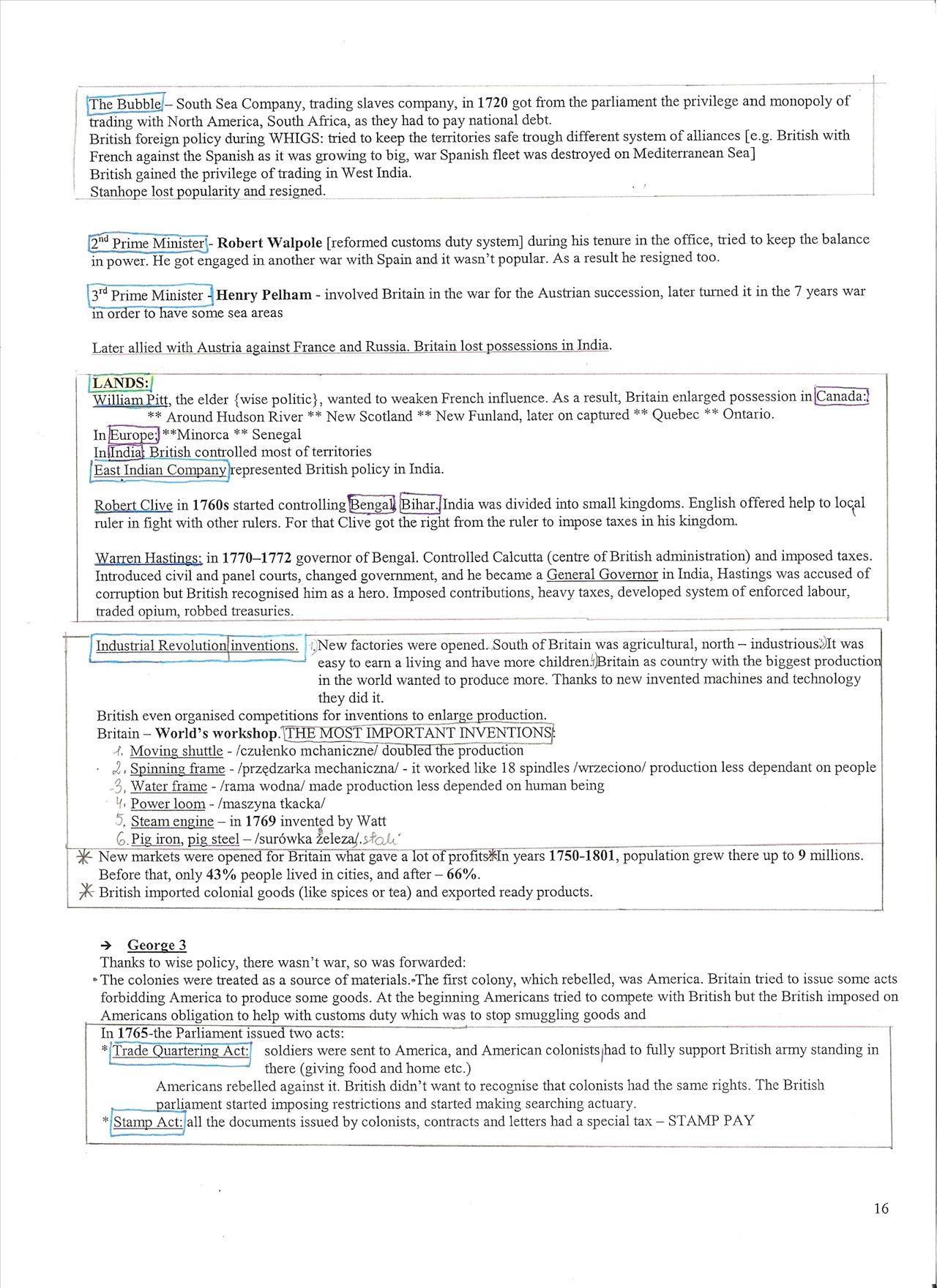skanuj0019 4

Jhe Bubblęj- South Sea Company, trading slaves company, in 1720 got from the parliament the privilege and monopoly of "trading with North America, South Africa, as they had to pay national debt.
British foreign policy during WHIGS: tried to keep the territories safe trough different system of allianccs [e.g. British with French against the Spanish as it was growing to big, war Spanish fleet was destroyed on Mediterranean Sea]
British gained the privilege of trading in West India.
Stanhope lost popularity and resigned.___ _
[2™1 2 Prime Minister]- Robert Walpole [reforined customs duty system] during his tenure in the office, tried to keep the balance in power. He got engaged in another war with Spain and it wasmt popular. As a result he resigned too.
3rd Prime Minister - Henry Pelham - involved Britain in the war for the Austrian succession, later tumed it in the 7 years war m order to'have some sea areas
Later allied with.Austria against France and Russia. Britain lost possessions in India.
;ŁaNPS:/ " _
William Pitt the elder {wise politic}, wanted to weaken French influence. As a result, Britain enlarged possession in Canada:!
__3 Around Hudson River 3 New Scotland 3 New Funland, later on captured 3 Quebec 3 Ontario.
In In
India
British controlled most of territories
East Indian Company jrepresented British policy in India.
Robert Clive in 1760s started controlling^engaj jBiharJlndia was divided into smali kingdoms. English offered help to lochał ruler in fight with other rulers. For tliat Clive got the right from the ruler to impose taxes in his kingdom.
Warren Hastinss: in 1770-1772 governor of Bengal. Controlled Calcutta (centre of British administration) and imposed taxes. Introduced civil and panel courts, changed govemment, and he became a General Govemor in India, Hastings was accused of corruption but British recognised him as a hero. Imposed contributions, heavy taxes, developed system of enforced labour, traded opium, robbed treasuries.
Industrial Revolution
inventions. .New factories were opened. South of Britain was agricultural, north - industriousMt was
'—} easy to earn a living and have morę children.ijBritain as country with the biggest production in the world wanted to produce morę. Thanks to new invented machines and technology they did it.
British even organised competitions for inventions to enlarge production.^
Britain - World’s workshop.ITHFMOSTIMPORTAŃTINYENTIONS^
A, Moving shuttle - /czułenko mchaniczneZ doubled the production '
• 2 • Spinning frame - /przędzarka mechaniczna/ - it worked like 18 spindles /wrzeciono/ production less dependant on people -3, Water frame - /rama wodna/ madę production less depended on human being f • Power loom - /maszyna tkacka/
5, Steam engine - in 1769 invented by Watt
*
(o. Pig iron, pig Steel - /surówka żeleza/.y^oA'____________
New markcts were opened for Britain what gave a lot of profits&In years 1750-1801, population grew there up to 9 millions. Before that, only 43% people lived in cities, and after - 66%.
British imported colonial goods (like spices or tea) and exported ready products.
Stamp Act: all the documents issued by colonists, contracts and letters had a special tax - STAMP PAY
.
16
4 George 3
Thanks to wise policy, there wasnh war, so was forwarded:
•The colonies were treated as a source of materials.-The First colony, which rebelled, was America. Britain tried to issue some acts forbidding America to produce some goods. At the beginning Americans tried to compete with British but the British imposed on Americans obligation to help with customs duty which was to stop smuggling goods and In 1765-the Parliament issued two acts:
jjrade Ouartering Act: soldiers were sent to America, and American colonists <had to ftilly support British army standing in ' there (giving food and home etc.)
Americans rebelled against it. British didn’t want to recognise that colonists had the same rights. The British parliament started imposing restrictions and started making searching actuary.
Wyszukiwarka
Podobne podstrony:
image049 1 m Fig. 26. The profile and plan of the remains of Ihe south-ea&tem wali base of the t
skanuj0009 (306) XTj £aaam /~CD © A Add salt, pepper and walnuts. B Add pineapples and cream to the
skanuj0132 (17) Podsumowanie Na zakończenie ćwiczenia można zadać uczestnikom m.in. następujące pyta
skanuj0136 (12) 280 1993 Chłopiec i jego bohater (The Boy and His Hero) 1994
skanuj0151 (12) Podsumowanie Na zakończenie ćwiczenia można zadać uczestnikom m.in. następujące pyta
skanuj0168 (13) Podsumowanie Na zakończenie ćwiczenia można zadać uczestnikom m.in. następujące pyta
więcej podobnych podstron